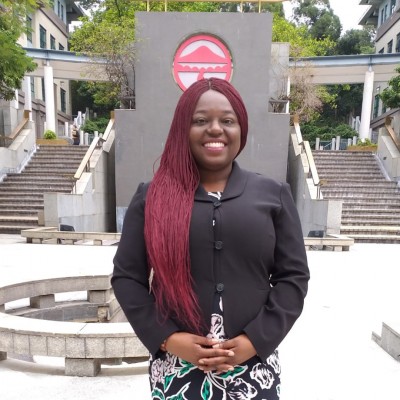
Uchechi Shirley Anaduaka
Working to make an impact
Doing research in a developing country can be riddled with problems. These may include a lack of access to essential resources, no licences to top journals and even as basic as problems with the internet. This seriously limits the results PhD students can achieve, no matter how hard they try.
This was a problem Uchechi Shirley Anaduaka was facing, while working towards her PhD as a lecturer at the Department of Economics, University of Nigeria in Nsukka, Southeast Nigeria.
“We don’t have access to a lot of resources, so we tend to recycle already produced PhDs, but I thought that was not a good way to go,” she explains. Armed with an MSc from the University of Warwick, UK, she started applying to universities in the western hemisphere, when she learned about Lingnan University from a friend, who studied in Hong Kong.
“I never thought about Asia because of the language differences, but when he said the language of teaching was English, I applied and received a scholarship from the Hong Kong PhD Fellowship Scheme,” she says.
Focusing on inequality
Her dissertation topic is intra-household dynamics. She looks at how differences in the family structure – single or two-parent households and polygamous households – can affect children’s health and, more generally, their future.
In a large part of Nigeria, polygamous marriage is practiced. The first part of Anaduaka’s PhD thesis is to link the evidence, that those women who marry into such arrangements usually have little or no education, cannot work outside of the home and have poorer health to the fact, that they are not able to make the best decisions for their children.
“The actual theme is inequality – I want to see how these differences can affect children’s outcomes. That is why the second part of my thesis looks at child protection,” she explains.
For example, only 30 per cent of children are officially registered at birth, and therefore, 70 per cent of them are not recognised by the state. This means, they will have difficulties in accessing health services, education and even opening a bank account or joining the workforce when they grow up.
“This also affects government planning. If the authorities don’t know how many children there are in the country, they may not be able to offer enough vaccinations, schools, teachers, and so on. It is a very big problem,” Anaduaka says. “I thought it was interesting to see some of the factors that were affected by the issue of birth registration.”
At Lingnan, she is able to find the most important research resources, while the university does its best to get additional resources where necessary through cooperation with Hong Kong’s seven other universities and tertiary institutions overseas. A range of research software is also available.
“Gone are the days of tables, pie charts, histograms and all that. You want to make it colourful and visual, but some of the tools are very expensive,” she notes.
Expanding horizons
For Anaduaka, one of the most memorable events of her PhD studies was the International Postgraduate Summer School organised by Lingnan and Hertford College, Oxford University, UK. After a week of workshops presented at Lingnan by world-class speakers and delivery of students’ special projects to fine-tune their presentation skills, participants spent two weeks in Oxford.
There, one of the most exciting projects was a poster-presentation, where students had to find ways to summarise their research from the introduction to the findings and present it on a poster. The 11 students had to explain their research to visitors based on the poster.
“You had to be very brief and creative. Much of our work was presented with colourful graphs,” she says. “The guests went around to see the posters, and you could see people crowding around if you told a good story, but it really had to be to the point.”
Originally, Anaduaka started to do a PhD to satisfy her university’s compulsory requirement for university lecturers. But, soon she realised that working on her thesis also expanded her horizon and helped her to become an independent critical thinker, which may help her get a position in a developmental organisation and make a contribution with a real impact on Africa.

